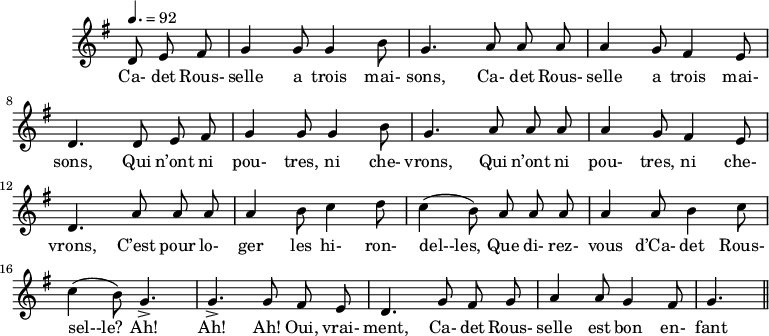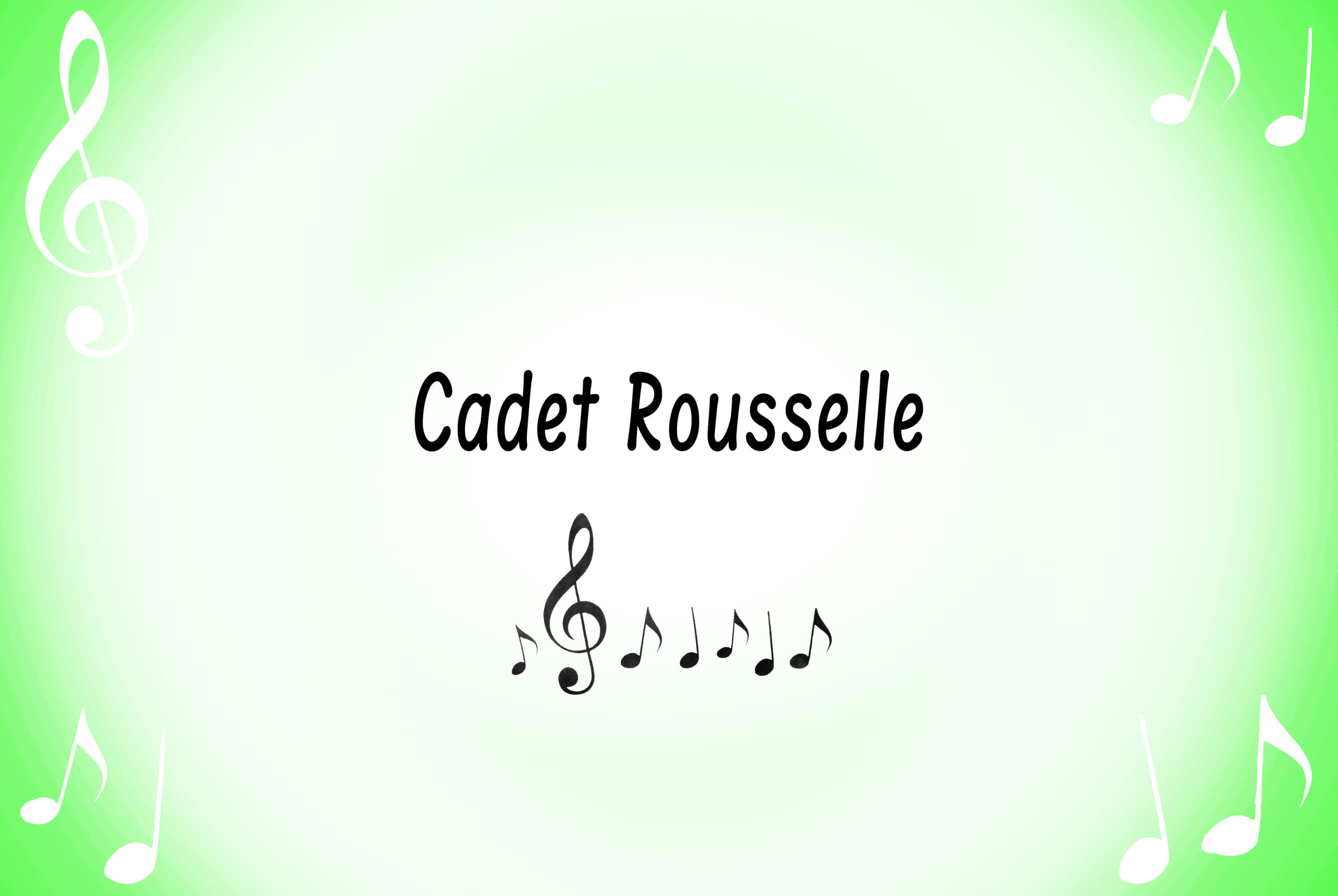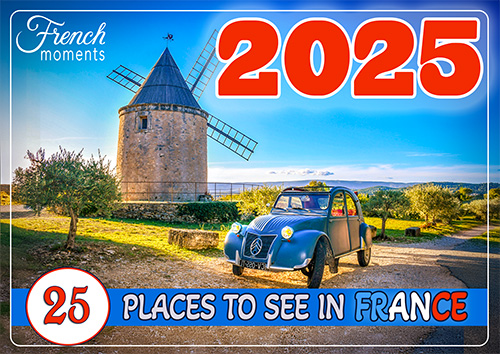Cadet Rousselle is a traditional French song with lyrics dating from the French Revolution that gently mocks an eccentric man from Auxerre in Burgundy who really existed.
The story of the song
It is known that it was the author of spiritual and satirical songs Gaspard de Chenu who wrote the song in 1792, to the tune of Jean de Nivelle.
Gaspard de Chenu wrote his song parodying that of Jean de Nivelle, which had been very popular in France since the end of the 15th century.
The song did not seem destined to spread beyond the boundaries of Auxerre. However, as the Auxerre enlisted men took it with them to the army, the soldiers adopted it enthusiastically and it became the song of the French Revolutionary Armies.
It subsequently spread to all classes of French society, where its popularity gradually eclipsed its model, the song Jean de Nivelle.
A popular song in the 19th century
The song did not seem destined to spread beyond the boundaries of Auxerre. However, as the Auxerre enlisted men took it with them to the army, the soldiers adopted it enthusiastically and it became the song of the French Revolutionary Army.

Armée du Rhin in 1793
It subsequently spread to all classes of French society, where its popularity gradually eclipsed its model, the song Jean de Nivelle.
In his 1874 novel Ninety-Three, Victor Hugo has Danton mock Robespierre for monopolising the floor at the Convention for two hours:
Cadet Rousselle fait des discours
Qui ne sont pas longs quand ils sont courts.
(Cadet Rousselle made speeches
That are not long when they are short.)
Then, the Russian compositor Tchaikovsky used the song in his ballet The Nutcracker.
Who was Cadet Rousselle?
Guillaume Joseph Rousselle (1743-1807) was a French bailiff from the town of Auxerre in Burgundy whose eccentricity was gently mocked in the song that bears his name.
![Auxerre Cathedral © Pline - licence [CC BY-SA 3.0] from Wikimedia Commons Auxerre Cathedral © Pline - licence [CC BY-SA 3.0] from Wikimedia Commons](http://frenchmoments.eu/wp-content/uploads/2023/01/Auxerre-Cathedral-©-Pline-licence-CC-BY-SA-3.0-from-Wikimedia-Commons-scaled.jpg)
Auxerre Cathedral © Pline - licence [CC BY-SA 3.0] from Wikimedia Commons
In the year following his appointment as bailiff in Auxerre, he bought a small, quirky house near the clock tower and had a narrow loggia added above an old porch.
The curious appearance of his home is as striking as the character of the man who is said to be jovial, bon vivant and a little eccentric, but who enjoys the sympathy of his fellow citizens.
This probably explains why this eccentric character inspired Gaspard de Chenu to compose the famous song.
About the song
Easy to memorize, the melody is joyful and bouncy.
In the tone of a joke, the various quirks of the character are the subject of as many couplets. Each verse is composed of four octosyllables (ie. a verse of eight syllables).
Each of the verses is usually about an element that the character is supposed to possess in triplicate. This element is often mentioned in the first line. The character has:
- three boys, etc.
- three big cats, etc.
- three hats, etc.
In the manner of a burst of laughter, the chorus reminds us that, despite his peculiarities (or perhaps because of them), the character enjoys the sympathy of his fellow citizens.
Cadet Rousselle
Lyrics, music, free download... let's learn more about the popular song:

The lyrics in French
The original song of Cadet Rousselle has 10 verses and a chorus.
Couplet 1
Cadet Rousselle a trois maisons, (bis)
Qui n'ont ni poutres, ni chevrons, (bis)
C'est pour loger les hirondelles,
Que direz-vous d'Cadet Rousselle ?
Refrain
Ah ! Ah ! Ah ! Oui, vraiment,
Cadet Rousselle est bon enfant !
Couplet 2
Cadet Rousselle a trois habits, (bis)
Deux jaunes, l'autre en papier gris, (bis)
Il met celui-ci quand il gèle,
Ou quand il pleut, ou quand il grêle.
Couplet 3
Cadet Rousselle a trois chapeaux, (bis)
Les deux ronds ne sont pas très beaux. (bis)
Et le troisième est à deux cornes,
De sa tête, il a pris la forme.
Couplet 4
Cadet Rousselle a trois souliers, (bis)
Il en met deux dans ses deux pieds ; (bis)
Le troisième n'a pas de semelle,
Il s'en sert pour chausser sa belle.
Couplet 5
Cadet Rousselle a trois cheveux, (bis)
Deux pour la face, un pour la queue, (bis)
Et quand il va voir sa maîtresse,
Il les met tous les trois en tresse.
Couplet 6
Cadet Rousselle a trois gros chiens, (bis)
L'un court au lièvre, l'autre au lapin ; (bis)
Le troisième fuit quand on l'appelle,
Tout comme le chien de Jean de Nivelle.
Couplet 7
Cadet Rousselle a trois beaux chats, (bis)
Qui n'attrapent jamais les rats ; (bis)
Le troisième n'a pas de prunelle,
Il monte au grenier sans chandelle.
Couplet 8
Cadet Rousselle a marié (bis)
Ses trois filles dans trois quartiers ; (bis)
Les deux premières sont moins que belles,
La troisième n'a pas de cervelle.
Couplet 9
Cadet Rousselle a trois deniers, (bis)
C'est pour payer ses créanciers ; (bis)
Quand il a montré ses ressources,
Il les resserre dans sa bourse.
Couplet 10
Cadet Rousselle ne mourra pas, (bis)
Car avant de sauter le pas, (bis)
On dit qu'il apprend l'orthographe,
Pour faire lui même son épitaphe
Translation of the lyrics into English
Here is an approximative translation into English:
Verse 1
Cadet Rousselle has three houses, (bis)
That have no beams, no rafters, (bis)
It's to house the swallows,
What will you say about Cadet Rousselle?
Chorus
Ah! Ah! Ah! Yes, really,
Cadet Rousselle is a good fellow!
Verse 2
Cadet Rousselle has three clothes, (bis)
Two yellow ones, the other made of grey paper, (bis)
He puts this one on when it's freezing,
Or when it rains, or when it hails.
Verse 3
Cadet Rousselle has three hats, (bis)
The two round ones are not very nice (bis)
And the third one has two horns,
Of his head, he has taken the shape.
Verse 4
Cadet Rousselle has three shoes, (bis)
He puts two in his two feet; (bis)
The third has no sole,
He uses them to put on his beautiful one.
Verse 5
Cadet Rousselle has three hairs, (bis)
Two for the face, one for the tail, (bis)
And when he goes to see his mistress,
He puts all three in a braid.
Verse 6
Cadet Rousselle has three big dogs, (bis)
One runs after the hare, the other after the rabbit; (bis)
The third runs away when called,
Just like Jean de Nivelle's dog.
Verse 7
Cadet Rousselle has three beautiful cats, (bis)
Who never catch rats; (bis)
The third has no eye,
He goes up to the attic without a candle.
Verse 8
Cadet Rousselle married (bis)
His three daughters in three quarters; (bis)
The first two are less than beautiful,
The third has no brains.
Verse 9
Cadet Rousselle has three deniers, (bis)
It is to pay his creditors; (bis)
When he has shown his resources,
He tightens them in his purse.
Verse 10
Cadet Rousselle will not die, (bis)
For before he takes the plunge, (bis)
They say he's learning to spell,
To make his own epitaph.


